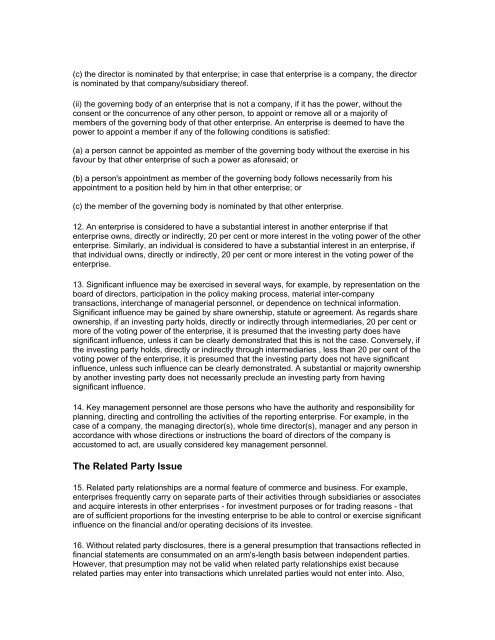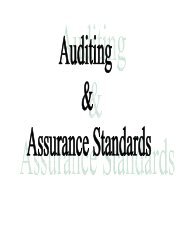Accounting Standards 1-29 - Seth & Associates
Accounting Standards 1-29 - Seth & Associates
Accounting Standards 1-29 - Seth & Associates
Create successful ePaper yourself
Turn your PDF publications into a flip-book with our unique Google optimized e-Paper software.
(c) the director is nominated by that enterprise; in case that enterprise is a company, the director<br />
is nominated by that company/subsidiary thereof.<br />
(ii) the governing body of an enterprise that is not a company, if it has the power, without the<br />
consent or the concurrence of any other person, to appoint or remove all or a majority of<br />
members of the governing body of that other enterprise. An enterprise is deemed to have the<br />
power to appoint a member if any of the following conditions is satisfied:<br />
(a) a person cannot be appointed as member of the governing body without the exercise in his<br />
favour by that other enterprise of such a power as aforesaid; or<br />
(b) a person's appointment as member of the governing body follows necessarily from his<br />
appointment to a position held by him in that other enterprise; or<br />
(c) the member of the governing body is nominated by that other enterprise.<br />
12. An enterprise is considered to have a substantial interest in another enterprise if that<br />
enterprise owns, directly or indirectly, 20 per cent or more interest in the voting power of the other<br />
enterprise. Similarly, an individual is considered to have a substantial interest in an enterprise, if<br />
that individual owns, directly or indirectly, 20 per cent or more interest in the voting power of the<br />
enterprise.<br />
13. Significant influence may be exercised in several ways, for example, by representation on the<br />
board of directors, participation in the policy making process, material inter-company<br />
transactions, interchange of managerial personnel, or dependence on technical information.<br />
Significant influence may be gained by share ownership, statute or agreement. As regards share<br />
ownership, if an investing party holds, directly or indirectly through intermediaries, 20 per cent or<br />
more of the voting power of the enterprise, it is presumed that the investing party does have<br />
significant influence, unless it can be clearly demonstrated that this is not the case. Conversely, if<br />
the investing party holds, directly or indirectly through intermediaries , less than 20 per cent of the<br />
voting power of the enterprise, it is presumed that the investing party does not have significant<br />
influence, unless such influence can be clearly demonstrated. A substantial or majority ownership<br />
by another investing party does not necessarily preclude an investing party from having<br />
significant influence.<br />
14. Key management personnel are those persons who have the authority and responsibility for<br />
planning, directing and controlling the activities of the reporting enterprise. For example, in the<br />
case of a company, the managing director(s), whole time director(s), manager and any person in<br />
accordance with whose directions or instructions the board of directors of the company is<br />
accustomed to act, are usually considered key management personnel.<br />
The Related Party Issue<br />
15. Related party relationships are a normal feature of commerce and business. For example,<br />
enterprises frequently carry on separate parts of their activities through subsidiaries or associates<br />
and acquire interests in other enterprises - for investment purposes or for trading reasons - that<br />
are of sufficient proportions for the investing enterprise to be able to control or exercise significant<br />
influence on the financial and/or operating decisions of its investee.<br />
16. Without related party disclosures, there is a general presumption that transactions reflected in<br />
financial statements are consummated on an arm's-length basis between independent parties.<br />
However, that presumption may not be valid when related party relationships exist because<br />
related parties may enter into transactions which unrelated parties would not enter into. Also,




